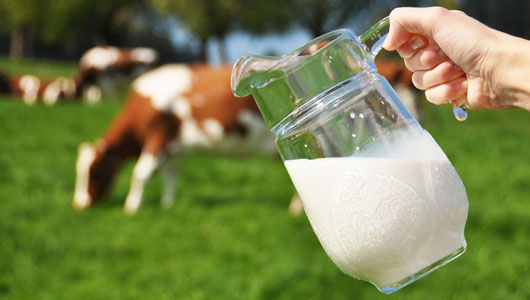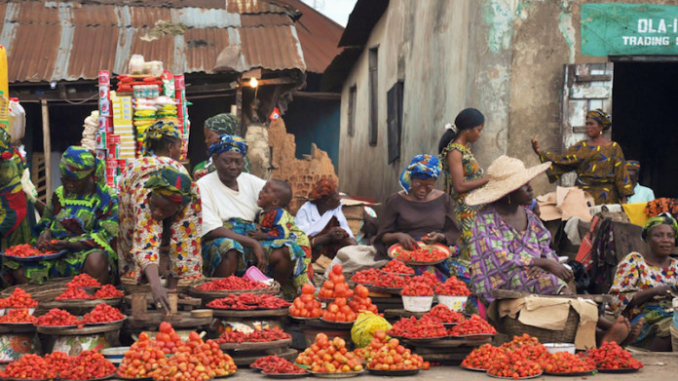Economy
Research Shows Leaders In Africa Dairy Product Market by Revenue


By Modupe Gbadeyanka
According to a market research report titled ‘Africa Dairy Products Market Outlook to 2020 – Inclining Demand for Yoghurt and Ice Cream across Africa to Boost Dairy Product Market’ by Ken Research.
Growing purchasing power parity and gross domestic product (GDP) of various African countries which majorly include Uganda, Sudan, and Kenya are the major factors which have driven the market for dairy products in Africa.
However, declining annual per capita consumption of dairy products which majorly includes milk powder, butter, and cheese in other major economies of the continent including South Africa, Nigeria, Tanzania, Ethiopia, and Algeria is restraining the market.
Dairy market in Uganda is largely unorganized with the presence of large number of small scale dairy farmers.
Processed milk is observed to dominate the Uganda dairy product industry owing to increased demand as an effect of government effort to remove problem of malnutrition in the market.
Uganda has a highly fragmented market with the presence of large number of small scale players with few global giants operating in the market.
Cows are the main milk producer in African countries but in Ethiopia a small proportion of milk contribution is done from camels and goats too in the pastoralist areas.
The dairy market in Ethiopia is facing few major constraints such as rapidly increasing population compared to livestock population in the nation, inferior feed quality and poor management of milk producing animals creating fertility problem and low disease resistance among cattle.
The growing trend among people to consume yoghurt as a substitute of dessert owing to its low sugar content is one of the major factor contributing towards growth of the segment. High prevalence of diabetic population in the continent has also increased the demand for yoghurt as dessert in Africa.
Additionally, the efforts by the market players to provide yoghurt to customers in diverse flavors and small packing as per their needs in economically sensitive countries of Africa further augment the sales of yoghurt.
Processed milk has a high nutrition value and is the only form of food which can provide complete nutritious diet to any individual. The fact makes the product most favourable and highly demanded dairy product in Africa as the continent is fighting against the problem of malnutrition among the children.
Tiger brands followed Unilever in the South Africa butter market owing to its affordable price range. Low labour costs and skilled workforce helped the company in providing butter at low price compared to its competitions in the market.
Wagasi is the most popular cheese made by the Fulani people from fresh cow milk. This type of cheese is most popular in the populated nations of Africa such as Nigeria, Guinea, Mali, Niger, Cameroon, Chad and South Sudan owing to its local production and habit of the taste among the people.
Ayibe cheese market is majorly driven by its high popularity in Ethiopia. Additionally, its own unique flavour had helped the food product gain status of complementary food item in the course of high class people of Africa to soften the effect of spicy food, hence driving the market.
High production of vanilla in African nation like Uganda has provided abundant natural raw material for ice cream manufacturing. Moreover, coco production is also high in the nations such as Ghana and Nigeria. High availability of natural raw material results in high manufacturing of vanilla and chocolate ice creams in various nations of Africa, making them dominating segments in the overall ice cream market.
South Africa dairy product market is a well-established market with the presence of recognized brands such as Parmalat, Dairybelle, Clover, Unilever, Nestle and Danone.
The established market players are recommended to setup their own manufacturing units across various nations in Africa and should fix the certain quantity of production exclusively for South African market which will help them to increase their market share in the nation by offering their dairy products at an affordable competitive price range hence, overcoming the local competition.
The dairy product market in Africa is speculated to have an increased number of organized players in future due to which market competition in various segments of dairy products will get more intense and competitive.
The impact of new entrants in the market would impact price of the products. It has been forecasted that the price of various milk powder would decrease in the future due to which market share for milk powder in the overall dairy product market in Africa is speculated to decrease.
Economy
Terrahaptix Secures Additional $22m from Investors, Valuation Hits $100m

By Adedapo Adesanya
Nigerian defence technology startup, Terra Industries, has extended its funding round to $34 million after securing an additional $22 million from investors, making it a $100 million company.
The new capital round was led by venture firm Lux Capital, with injections from the chief executive officer of Lagos-based unicorn Flutterwave, Mr Gbenga Agboola, as well as angel investors such as American actor Jared Leto and Jordan Nel.
The company said in a statement on Monday that the round was completed in under two weeks.
This comes weeks after it raised $11.75 million in January. That funding round was led by 8VC founded by the co-founder of Palantir Technologies Inc., Mr Joe Lonsdale. Other investors included Valor Equity Partners, Lux Capital, SV Angel, Leblon Capital GmbH, Silent Ventures LLC, Nova Global and angel investors, including Mr Meyer Malka — the managing partner of Ribbit Capital.
Some of the investors in the new round included 8VC, Nova Global, Silent Ventures, Belief Capital, Tofino Capital, and Resilience17 Capital, founded by Flutterwave CEO.
Terrahaptix, founded by Mr Nathan Nwachukwu and Mr Maxwell Maduka, will use the new funding to expand Terra’s manufacturing capacity as it expands into cross-border security and counter-terrorism.
The extension also comes amid growing international expansion. Earlier this month, Terra announced a partnership with Saudi industrial giant AIC Steel to launch a manufacturing hub in Saudi Arabia focused on producing infrastructure security systems.
In the coming weeks, the company also plans to unveil a mega factory, an indication of the company’s growth and importance, particularly as the need for security has risen in recent years, as groups such as Islamic State and al-Qaeda are gaining ground in Africa, converging along a swathe of territory that stretches from Mali to Nigeria.
According to Mr Nwachuku, the initial $11.75 million raise created significant momentum for the company, enabling it to close the additional $22 million in just under two weeks.
He added that beyond capital, the investors were selected for their experience building similar hard-tech and defence-focused companies.
Economy
Analysts Predict 18% Inflation Rate for January 2026

By Adedapo Adesanya
Analysts have projected that Nigeria’s headline inflation could rise to about 18 per cent in January, defying the downward trend recorded in 2025.
The forecast comes ahead of the first Consumer Price Index (CPI) data release by the National Bureau of Statistics (NBS) of 2026 due on Monday.
Headline inflation closed December at 15.15 per cent year-on-year, while the annual average eased sharply to 23.33 per cent from 33.18 per cent in 2024.
According to analysts at Cowry Research, the recent CPI normalisation has created a lower base for January comparisons, making a temporary uptick in headline inflation likely in January and possibly February. It projects inflation to trend within the 17.8 per cent to 18.7 per cent range in 2026, driven by election-related spending pressures and fading base effects, even as structural reforms support a medium-term disinflation path.
Similarly, analysts at Quest Merchant Bank said the lower base effect could push January inflation to around 18 per cent to 19 per cent. They, however, expect inflation to resume a broadly disinflationary trajectory over the course of the year, supported by softer energy prices, stable exchange rate conditions and easing food costs.
Last year’s deceleration was driven largely by base effects after the stats office normalised its CPI computation methodology. Unlike previous rebasing exercises that used a single month as the base period, the agency calculated the base using the average of all months in 2024. The rebasing also involved reweighting several categories and expanding the inflation basket to 934 items from 740.
In December alone, the NBS published two separate inflation figures for December after the CPI methodology tweaking caused the headline rate to more than double.
Nigeria’s inflation data are closely monitored by the Central Bank of Nigeria (CBN) as it transitions toward an inflation-targeting monetary policy framework.
The CBN has already factored in the CPI rebasing and related computational issues in its three-year inflation forecast.
The apex bank is targeting a slowdown in inflation to around 13 per cent by next year, despite current price pressures and statistical adjustments.
The Monetary Policy Committee (MPC) will meet next week, and today’s inflation report will form the basis for whether there will be a cut or hold in the interest rates.
Economy
Deap Capital, Access Holdings, Zenith Bank Lead Activity Chart

By Dipo Olowookere
The trio of Deap Capital Management & Trust, Access Holdings, and Zenith Bank led the activity chart of the Nigerian Exchange (NGX) Limited last week.
In the five-day trading week, Customs Street posted a total turnover of 4.652 billion shares worth N193.326 billion in 286,751 deals compared with the 3.860 billion shares valued at N128.581 billion traded in 240,463 deals a week earlier.
According to data, financial services equities dominated the activity chart with 2.782 billion units sold for N74.063 billion in 104,325 deals, contributing 59.81 per cent and 38.31 per cent to the total trading volume and value, respectively.
Services stocks recorded the sale of 573.189 million units worth N7.177 billion in 28,784 deals, and consumer goods shares exchanged 317.667 million units valued at N24.027 billion in 33,280 deals.
Deap Capital, Access Holdings, and Zenith Bank accounted for 980.253 million shares worth N30.182 billion in 25,390 deals, contributing 21.07 per cent and 15.61 per cent to the total trading volume and value apiece.
Business Post reports that 79 equities appreciated versus 71 equities in the previous week, as 27 stocks depreciated versus 35 stocks in the previous week, while 42 shares closed flat, the same as the previous week.
Zichis was the best-performing stock after it gained 60.71 per cent to trade at N10.80, Union Dicon appreciated by 60.15 per cent to N20.90, DAAR Communications grew by 55.26 per cent to N2.95, Fortis Global Insurance rose by 50.00 per cent to 39 Kobo, and John Holt grew by 45.21 per cent to N10.60.
On the flip side, Abbey Mortgage Bank lost 26.42 per cent to quote at N11.00, Sovereign Trust Insurance shrank by 17.16 per cent to N2.80, Ecobank declined by 13.29 per cent to N45.00, SAHCO went down by 11.59 per cent to N135.00, and Austin Laz depleted by 11.11 per cent to N4.80.
Last week, the All-Share Index (ASI) and the market capitalisation appreciated by 6.16 per cent to 182,313.08 points and N117.027 trillion, respectively.
In the same vein, all other indices finished higher with the exception of the sovereign bond index, which fell by 0.01 per cent.
-

 Feature/OPED6 years ago
Feature/OPED6 years agoDavos was Different this year
-
Travel/Tourism10 years ago
Lagos Seals Western Lodge Hotel In Ikorodu
-

 Showbiz3 years ago
Showbiz3 years agoEstranged Lover Releases Videos of Empress Njamah Bathing
-

 Banking8 years ago
Banking8 years agoSort Codes of GTBank Branches in Nigeria
-

 Economy3 years ago
Economy3 years agoSubsidy Removal: CNG at N130 Per Litre Cheaper Than Petrol—IPMAN
-

 Banking3 years ago
Banking3 years agoSort Codes of UBA Branches in Nigeria
-

 Banking3 years ago
Banking3 years agoFirst Bank Announces Planned Downtime
-

 Sports3 years ago
Sports3 years agoHighest Paid Nigerian Footballer – How Much Do Nigerian Footballers Earn











